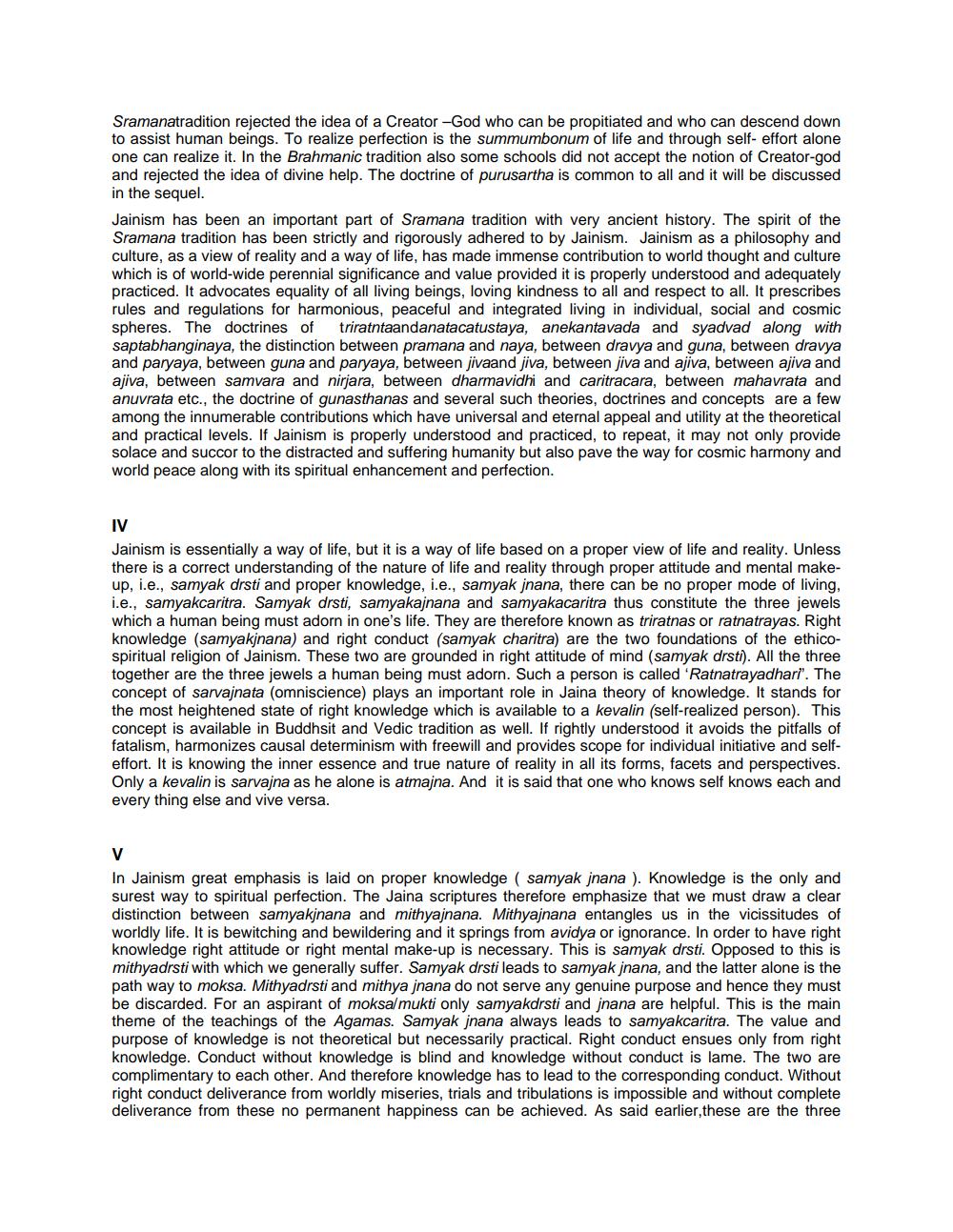Book Title: Jaina View Towards Philosophical Inquiry and Harmonious Ways of Living Author(s): S R Bhatt Publisher: ZZZ Unknown View full book textPage 5
________________ Sramanatradition rejected the idea of a Creator -God who can be propitiated and who can descend down to assist human beings. To realize perfection is the summumbonum of life and through self-effort alone one can realize it. In the Brahmanic tradition also some schools did not accept the notion of Creator-god and rejected the idea of divine help. The doctrine of purusartha is common to all and it will be discussed in the sequel. Jainism has been an important part of Sramana tradition with very ancient history. The spirit of the Sramana tradition has been strictly and rigorously adhered to by Jainism. Jainism as a philosophy and culture, as a view of reality and a way of life, has made immense contribution to world thought and culture which is of world-wide perennial significance and value provided it is properly understood and adequately practiced. It advocates equality of all living beings, loving kindness to all and respect to all. It prescribes rules and regulations for harmonious, peaceful and integrated living in individual, social and cosmic spheres. The doctrines of triratntaandanatacatustaya, anekantavada and syadvad along with saptabhanginaya, the distinction between pramana and naya, between dravya and guna, between dravya and paryaya, between guna and paryaya, between jivaand jiva, between jiva and ajiva, between ajiva and ajiva, between samvara and nirjara, between dharmavidhi and caritracara, between mahavrata and anuvrata etc., the doctrine of gunasthanas and several such theories, doctrines and concepts are a few among the innumerable contributions which have universal and eternal appeal and utility at the theoretical and practical levels. If Jainism is properly understood and practiced, to repeat, it may not only provide solace and succor to the distracted and suffering humanity but also pave the way for cosmic harmony and world peace along with its spiritual enhancement and perfection. IV Jainism is essentially a way of life, but it is a way of life based on a proper view of life and reality. Unless there is a correct understanding of the nature of life and reality through proper attitude and mental makeup, i.e., samyak drsti and proper knowledge, i.e., samyak jnana, there can be no proper mode of living, i.e., samyakcaritra. Samyak drsti, samyakajnana and samyakacaritra thus constitute the three jewels which a human being must adorn in one's life. They are therefore known as triratnas or ratnatrayas. Right knowledge (samyakjnana) and right conduct (samyak charitra) are the two foundations of the ethicospiritual religion of Jainism. These two are grounded in right attitude of mind (samyak drsti). All the three together are the three jewels a human being must adorn. Such a person is called 'Ratnatrayadhari". The concept of sarvajnata (omniscience) plays an important role in Jaina theory of knowledge. It stands for the most heightened state of right knowledge which is available to a kevalin (self-realized person). This concept is available in Buddhsit and Vedic tradition as well. If rightly understood it avoids the pitfalls of fatalism, harmonizes causal determinism with freewill and provides scope for individual initiative and selfeffort. It is knowing the inner essence and true nature of reality in all its forms, facets and perspectives. Only a kevalin is sarvajna as he alone is atmajna. And it is said that one who knows self knows each and every thing else and vive versa. In Jainism great emphasis is laid on proper knowledge (samyak jnana ). Knowledge is the only and surest way to spiritual perfection. The Jaina scriptures therefore emphasize that we must draw a clear distinction between samyakinana and mithyajnana. Mithyajnana entangles us in the vicissitudes of worldly life. It is bewitching and bewildering and it springs from avidya or ignorance. In order to have right knowledge right attitude or right mental make-up is necessary. This is samyak drsti. Opposed to this is mithyadrsti with which we generally suffer. Samyak drsti leads to samyak jnana, and the latter alone is the path way to moksa. Mithyadrsti and mithya jnana do not serve any genuine purpose and hence they must be discarded. For an aspirant of moksalmukti only samyakdrsti and jnana are helpful. This is the main theme of the teachings of the Agamas. Samyak jnana always leads to samyakcaritra. The value and purpose of knowledge is not theoretical but necessarily practical. Right conduct ensues only from right knowledge. Conduct without knowledge is blind and knowledge without conduct is lame. The two are complimentary to each other. And therefore knowledge has to lead to the corresponding conduct. Without right conduct deliverance from worldly miseries, trials and tribulations is impossible and without complete deliverance from these no permanent happiness can be achieved. As said earlier, these are the threePage Navigation
1 ... 3 4 5 6 7 8 9 10 11
